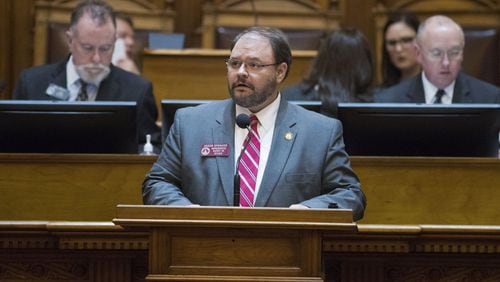The sponsor of Georgia legislation to allow older adults to sue people they say molested them when they were children is trying a legislative maneuver to save his bill.
After the Senate amended the Hidden Predator Act of 2018, Rep. Jason Spencer, R-Woodbine, on Friday got his colleagues in the House of Representatives to revive the version they adopted by a 170-0 vote last month.
Spencer is trying to build on a law by the same name that he got passed in 2015, portions of which are expiring.
The version adopted by the House on Feb. 28 extended the statute of limitations for lawsuits to age 38 from the current 23, and it opened a one-year window for adults of any age to sue. It also allowed lawsuits against organizations accused of harboring predators even if the sexual abuse and the cover-up occurred decades ago.
But on Thursday the Senate Judiciary Committee, which had been lobbied by the Roman Catholic Archdiocese of Atlanta and by the Boy Scouts of America, changed the bill in a way that made it harder to sue such organizations.
The committee chairman, Sen. Jesse Stone, R-Waynesboro, called the one-year window an “open season” on organizations accused of covering up abuse. Among his committee’s many amendments was the elimination of that window and a change of the statute of limitations to age 30.
Spencer was not happy about it.
“This bill essentially became inert,” he said Friday. “If it was an open season, we would have a thousand cases from 2015 and we only have 14.”
There’s a good chance that at least some of the 14 lawsuits stemming from the Hidden Predator Act of 2015 would have to be dismissed from court if the Senate’s version becomes law because it limits suits involving older incidents.
So on Friday morning, Spencer got the House Rules Committee to pull a switcheroo. The committee gutted an unrelated bill already approved by the Senate and substituted the House version of the Hidden Predator Act. Now Spencer’s House Bill 605 is Senate Bill 335.
“Our leadership wants to make sure that the Senate is aware of the House’s position,” Spencer said.
The senator who authored SB 335 wasn’t happy about it.
Sen. Renee Unterman, R-Buford, wasn’t concerned that her human sex trafficking bill had been deleted; the element making it clear that a person can be charged with trafficking if he or she “patronizes” someone in sexual servitude had been moved into a different bill that already passed both chambers. But she was offended by the House’s decision to erase the Senate’s work on the Hidden Predator Act.
“What they’re essentially saying is we don’t care what you’ve done to revise the bill,” Unterman said. “We have many distinguished attorneys on the [Senate] Judiciary Committee, and they worked many, many hours on it, and we think our version is better.”
She predicted that the House maneuver would prove futile and that Spencer’s bill would end up in a conference committee, where a handful of lawmakers from each chamber attempt to reach a compromise.
If it does, those lawmakers will face pressure from both sides. The Boy Scouts and the Catholic Church are concerned about the difficulty of defending against lawsuits in decades-old cases where the evidence is stale. Lawyers testified at a Senate hearing that the costs could rise into the hundreds of thousands of dollars in cases that drag on for years.
But people who say they were abused and can’t get justice because the criminal statute of limitations expired are demanding access to the civil courts. Jackie Holder of Vidalia, who says her grown son survived abuse as a boy, is angered by the Senate’s decision to weaken the Hidden Predator Act as a tool for victims.
“You have just told a group of people that their pain and suffering don’t matter,” she said.
She worries that opponents of the bill are trying to run out the clock. The legislative session ends Thursday, and neither version of the Hidden Predator Act has passed both the full Senate and the full House yet.
MYAJC.COM: REAL JOURNALISM. REAL LOCAL IMPACT.
The AJC's Ty Tagami keeps you updated on the latest happenings in K-12 education issues affecting Georgia. You'll find more on myAJC.com, including these stories:
- Sponsor: Senate's changes wreck law to allow child-sex lawsuits
- GOP senators exclude Democrats, public, from meeting about weakening legislation for child sex abuse victims
- Conservative groups split over child sex abuse legislation
- Lobbyist for Archdiocese tries to gut childhood sexual abuse bill
- Georgia bill extends deadline for victims of child sex abuse to sue
- Lobbying has already started on child sex-abuse legislatio n
- Boy Scouts fight Ga. effort to lengthen window for sex assault charges
- Ga. Legislature: Child sex abuse bill fails to make it out of subcommittee, again
- How a Georgia case, law paved way for USA Gymnastics doctor's downfall
- Legislator wants tougher Hidden Predator Act to pursue sex offenders
Never miss a minute of what's happening in state and local education. Subscribe to myAJC.com.








